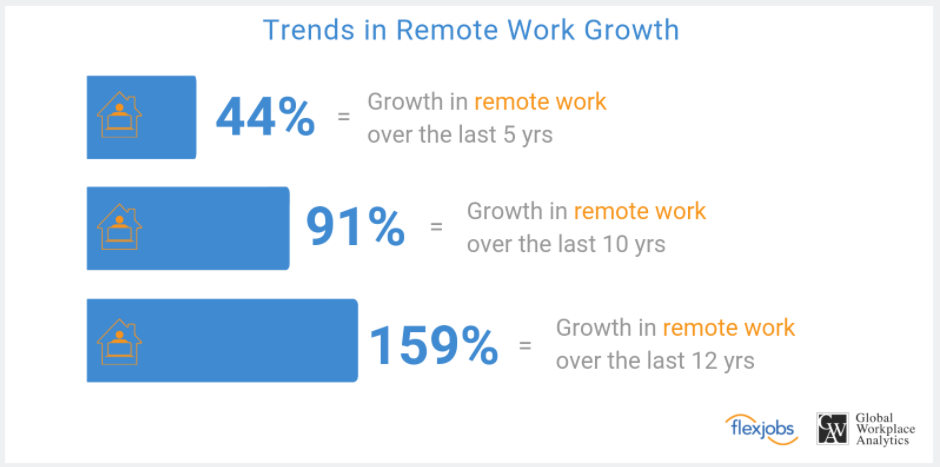How to Convince Your Boss to Let You Work Remotely

Remote work enjoys a new lease of life in 2020. COVID-19 pushed for this to some extent, forcing most managers to reframe their working processes and attitude toward this form of cooperation with employees. But even if disregarding COVID, remote work has remained popular among the new generation of workers for a long time:
- Over the last five years, the remote workforce has grown 44%, and over the previous ten years -- 91%.
- 99% of remote workers would like to continue doing so.
- 73% of teams will have remote workers by 2028.

But despite this, some employers are still in doubt whether this form of work is beneficial in their particular case. (44% of companies globally don’t allow remote work.)
What if your boss is one of such employers? How to convince him/her to give you a chance to demonstrate productivity and work efficiency with no need to stay in the office from 9 to 5?
In this article, you’ll find the answers.
Traditionalists vs. Remote workers
Traditionalists are notoriously hard sells. Regardless of the debate, there’s a certain class of people who hold fast to their beliefs, despite the outside world. While remote working might not sound controversial, the ideological divides are clearly drawn.
In recent years, Google, Yahoo, and Best Buy have all made headlines with their hard and fast stances on “no remote working” policies. And even though young people still accept office work — scouring job search resources for students in particular — some studies put the number of millennials who prefer telecommuting at upwards of 70%.
If you’re part of that whopping majority, then going up against traditionalists — especially if they’re your boss — can be daunting. However, as Dale Carnegie put it, “There is only one way under high heaven to get anybody to do anything. That is by making the other person want to do it.” In other words, convincing your boss to let you work remotely shouldn’t be about driving home how much happier and more fulfilled you’ll be.
Instead, to win your boss over, focus on the three major benefits of working remotely for them: productivity, relationships, and presence.

Source: Unsplash
1. Productivity
Concerns about productivity are naturally a top concern for any employer. It may sound dated, but many people still equate remote work with laziness. Research, however, indicates the exact opposite. To help your case, arm yourself with these four examples.
First, according to the recent data, working from home can lead to a “47% performance increase” across the board.
Second, it’s been nine years since Microsoft’s Work Without Walls study — which surveyed over 3,500 employees nationwide — concluded definitively that “businesses stand to be more productive by implementing a remote-work policy.” Is there anyone in 2020 who still doesn't believe that?
Third, remote working policies at American Express and Aetna enabled those two industry leaders to respectively save $10- $15 million and $78 million in overhead costs per year.
Fourth, the 2015 ConnectSolutions’ study — who manages cloud services for the likes of Adobe Connect and Microsoft Lync — unearthed a host of remote working benefits: most notably, 77% greater productivity and surprisingly a 52% reduction in employees’ likelihood to “take time off.”
Those are all powerful numbers. But remember: you’re not going to do battle with your boss. Don’t trot out your case like a prosecuting attorney. While all of these statistics can be well presented on paper, if you’re talking one-on-one, then do exactly that: just talk.
2. Relationships
Productivity isn’t the only important factor. Your absence in the office may influence other employees as well as negatively impact the sense of team your coworkers may share. So, your next line of reasoning should focus on how remote work won't remove you from the professional environment (i.e., relationships).
Technology alleviates this problem immensely. Provide a short but comprehensive list of the relational tools that will keep you connected: workflow tools like Trello or Basecamp, instant messenger tools like Slack, audio and video tools like Skype or Google Hangouts, and of course traditional tools like email and your smartphone.

Source: Unsplash
You could also refer to The Conference Board report that points out these technologies turn work “into a more mobile, remote activity” regardless of your location. Or, mention David Pogue, a technology columnist for The New York Times, who explains that workers don't need desk chairs anymore because “in this age of phones, tablets and laptops, people slouch and lean back and curl up in all kinds of new ways.”
Attending required in-office meetings may be an issue, too. Ease your way into remote work by still being physically present when needed. But to carry even more conviction, follow the advice of Business Insider contributor Drew Hendricks and “try citing successful companies like Toptal or Auttomatic that operate on a completely remote model.”
3. Presence
Lastly, availability is your master card in formulating a proposal on working remotely. I’ve touched on this already, but it’s worth highlighting in its own way. Impress on your full presence by email, phone, audio and video chats during your working hours.
According to Alan Henry from Lifehacker, “being available and regularly in touch will be your strongest tool in making sure that all are happy with the idea of you working from home.” Plus, “being open to these options helps build the kind of trust that's essential to telecommuting.”
A good idea would be to ask for a part-time schedule first. Elizabeth Lowman from The Muse suggests “explaining that you will be fully available by phone, email, IM, or whatever, during those hours.” Outline the benefits of such an arrangement and present it the way “telecommuting will also mean that you can start work earlier by avoiding 60 minutes in the car each morning.”
Be flexible and prove yourself. Use a trial period to demonstrate you are as available as you were in the office, beat deadlines to prove that work in a distraction-free environment boosts your productivity, and show your boss that he risks nothing when allowing you to work remotely.
There are always two sides to every debate, and working from home can be either a blessing or a curse. By considering both the positives and negatives of remote work and focusing directly on what’s in it for your boss, you’ll be armed with strong arguments and stand more than a fighting chance at convincing your boss.